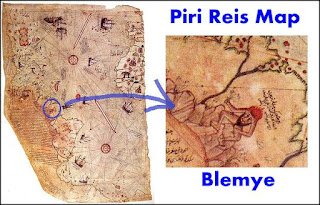Pir Reis 1513 map showing a Blemye (inside blue circle; enlarged on the right side). Copyright © 2012 by Austin Whittall
My previous post mentioned Blemyes as reported by English explorer, nobleman, adventurer and sailor, Sir Walter Raleigh in 1596, along the Northeastern coasts of South America, in Guyana.
These creatures lacked a head, and had their hair sprout from their shoulders and their face set in their chests. They are obviously mythical beings and had been mentioned previously by Pliny the elder and several medieval sources. So it is quite likely that Sir Walter included them in his accounts to add a touch of spice to Guyana. Nevertheless, they do appear in South America, in another unexpected source: Admiral Piri Reis map.
Note: Othello, by William Shakespeare, written c. 1603 in Act 1, Scene 3, Page 7, has Othello say: "The Anthropophagi, and men whose heads. Grew beneath their shoulders. These things to hear. Would Desdemona seriously incline." (Bold mine). Perhaps Shakespeare was inspired by Sir Walter's book.
Piri Reis Map
This map was drawn c. 1513 by a Turkish Admiral named Piri Reis and I have already posted on other strange creatures depicted in it (unicorns, monkeys and dog-faced men).
This map shows a Blemye and as can be seen in the image above, it is located in the right place, in Northern South America, between two large rivers, one to the north, the other to the south, which must surely be the Orinoco and Amazon rivers respectively. Exactly where Raleigh would place it 83 years later, in Guyana.
The red-haired creature sports a beard and holds something in his right hand. There is an Arabic caption above his head... but I have not found out yet what it says. (Will do some research on that caption).
Interestingly Neanderthals seem to have had red hair [1] (but they also had other colors according to a recent controversial article that suggested that in the sample studied, all three Neandertals had brown eyes and a dark complexion, and two had brown hair while one was red-haired.[2]
So, could the Blemye shown on Piri Reis' map be a Neanderthal?
It was here, in Guyana that odd humanoids have been reported (the Didi and other ape-men). Coincidence or deliberate actions? (after all, those who reported sightings in the 1800s knew about Piri Reis and Raleigh's account, so they could have used them as a source of inspiration).
Lets see if we can find more information on these odd "Neanderthals" in Guyana along the Orinoco River.
Sources
[1] Harvard University (2007, October 25). Ancient DNA Reveals That Some Neanderthals Were Redheads. ScienceDaily. Retrieved March 27, 2012
[2] Cerqueira, C. C. S., Paixão-Côrtes, V. R., Zambra, F. M. B., Salzano, F. M., Hünemeier, T. and Bortolini, M.-C. (2012), Predicting homo pigmentation phenotype through genomic data: From neanderthal to James Watson. Am. J. Hum. Biol.. doi: 10.1002/ajhb.22263
Patagonian Monsters - Cryptozoology, Myths & legends in Patagonia Copyright 2009-2011 by Austin Whittall ©

















I am not sure, but may be the translation is:
ReplyDeleteIn this spot there are oxen with one horn, and also monsters in this shape.
http://www.turkeyinmaps.com/piri.html#XXII.
A very good website for the translation:
ReplyDeletehttp://www.turkeyinmaps.com/piri.html#XXII.
Hi, I saw that years ago and it's good that you posted it, I always believed it was a "Chachapoya" man, the chachapoyas were well organized, they were called people of the clouds and famous because of their red hair. You can google about chachapoyas in Peru, I saw the area and it's inside Peru, the patagonian were at the south atlantic. Don't get confused with peruvian indians, before the spanish, peruvian indians were tan, white and very dark, also tall and little man. Good Luck!!
ReplyDeleteFrancis A.
They are the Si Te Cah... the red hair pale Giants
ReplyDelete